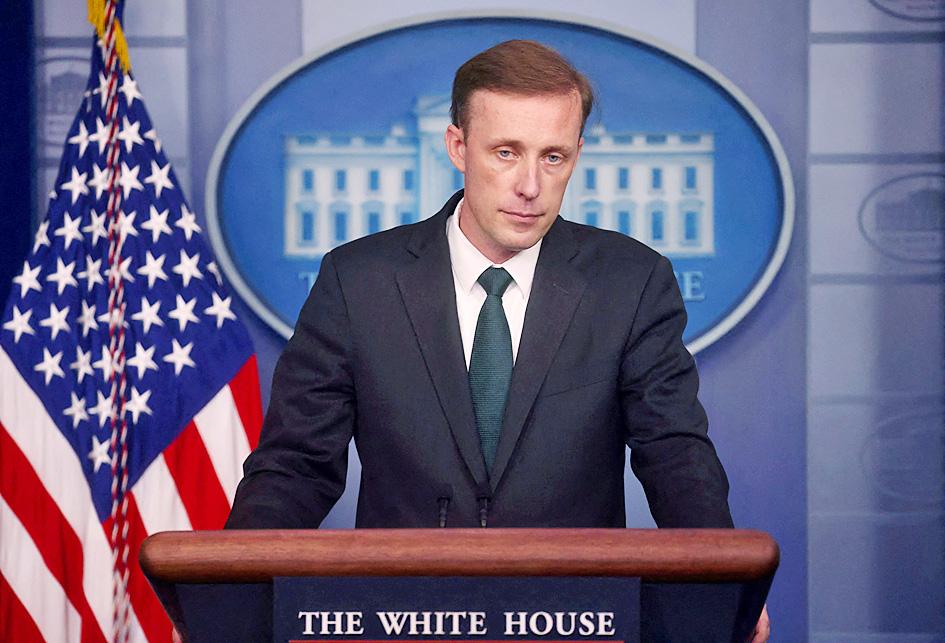Top US and China officials discussed Taiwan, Ukraine and other security issues in Luxembourg, in the latest sign that leaders of the world’s two largest economies are trying to keep high-level communications open despite simmering tensions.
The meeting between US National Security Adviser Jake Sullivan and top Chinese diplomat Yang Jiechi (楊潔篪) on Monday “included candid, substantive and productive discussion of a number of regional and global security issues, as well as key issues in US-China relations,” the White House said in a statement, without elaborating.
The meeting lasted for four-and-a-half hours, said a senior US administration official who briefed reporters afterward.

Photo: Reuters
The two men discussed Taiwan, the South China Sea, the war in Ukraine and North Korea’s nuclear program, Xinhua news agency reported yesterday.
Although Yang said Beijing is ready to work with Washington to find ways of cooperating, he complained that the “US side has been insisting on further containing and suppressing China in an all-round way.”
He said the US “should correct its strategic perceptions of China.”
The talks might fuel speculation that US President Joe Biden and Chinese President Xi Jinping (習近平) are to speak again soon.
US Secretary of Defense Lloyd Austin and Chinese Minister of National Defense General Wei Fenghe (魏鳳和) agreed to further discussions after a face-to-face encounter — their first — on Friday in Singapore.
In-person meetings between Sullivan and Yang in Europe — in October last year and again in March — led to calls between Biden and Xi.
Chinese Ministry of Foreign Affairs spokesman Wang Wenbin (汪文斌) told a regular news briefing in Beijing yesterday that he had no information about a potential call involving the presidents.
“Both China and the US believe that to keep the line of communication open is necessary and beneficial,” he said.
Regarding the Luxembourg meeting, the White House said: “Mr Sullivan underscored the importance of maintaining open lines of communication to manage competition between our two countries.”
Sullivan reiterated the US’ “one China” policy on Taiwan and China, and expressed concern about Beijing’s activities in the Taiwan Strait, said the senior administration official, who asked not to be identified as a condition of participation in the briefing.
He also expressed US concern about China’s veto of a UN Security Council resolution last month that would have imposed new sanctions on North Korea over Pyongyang’s ballistic missile tests, the official said.
Washington notified Taipei of the meeting between Sullivan and Yang beforehand, and would give a briefing on it soon, Ministry of Foreign Affairs spokeswoman Joanne Ou (歐江安) said in Taipei yesterday, while declining to comment further.
Additional reporting by Lu Yi-hsuan

The paramount chief of a volcanic island in Vanuatu yesterday said that he was “very impressed” by a UN court’s declaration that countries must tackle climate change. Vanuatu spearheaded the legal case at the International Court of Justice in The Hague, Netherlands, which on Wednesday ruled that countries have a duty to protect against the threat of a warming planet. “I’m very impressed,” George Bumseng, the top chief of the Pacific archipelago’s island of Ambrym, told reporters in the capital, Port Vila. “We have been waiting for this decision for a long time because we have been victims of this climate change for

MASSIVE LOSS: If the next recall votes also fail, it would signal that the administration of President William Lai would continue to face strong resistance within the legislature The results of recall votes yesterday dealt a blow to the Democratic Progressive Party’s (DPP) efforts to overturn the opposition-controlled legislature, as all 24 Chinese Nationalist Party (KMT) lawmakers survived the recall bids. Backed by President William Lai’s (賴清德) DPP, civic groups led the recall drive, seeking to remove 31 out of 39 KMT lawmakers from the 113-seat legislature, in which the KMT and the Taiwan People’s Party (TPP) together hold a majority with 62 seats, while the DPP holds 51 seats. The scale of the recall elections was unprecedented, with another seven KMT lawmakers facing similar votes on Aug. 23. For a

Rainfall is expected to become more widespread and persistent across central and southern Taiwan over the next few days, with the effects of the weather patterns becoming most prominent between last night and tomorrow, the Central Weather Administration (CWA) said yesterday. Independent meteorologist Daniel Wu (吳德榮) said that based on the latest forecast models of the combination of a low-pressure system and southwesterly winds, rainfall and flooding are expected to continue in central and southern Taiwan from today to Sunday. The CWA also warned of flash floods, thunder and lightning, and strong gusts in these areas, as well as landslides and fallen

All 24 lawmakers of the main opposition Chinese Nationalists Party (KMT) on Saturday survived historical nationwide recall elections, ensuring that the KMT along with Taiwan People’s Party (TPP) lawmakers will maintain opposition control of the legislature. Recall votes against all 24 KMT lawmakers as well as Hsinchu Mayor Ann Kao (高虹安) and KMT legislative caucus whip Fu Kun-chi (傅崐萁) failed to pass, according to Central Election Commission (CEC) figures. In only six of the 24 recall votes did the ballots cast in favor of the recall even meet the threshold of 25 percent of eligible voters needed for the recall to pass,